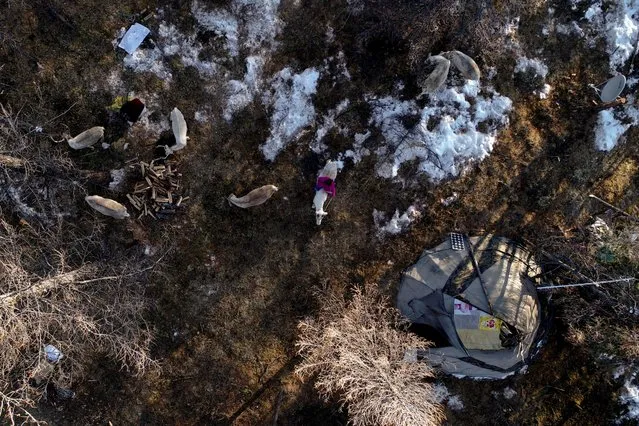
Erdenebat Chuluu, a nomadic herder, has lived all his life in the centuries-old tradition of his Dukha ancestors, renowned for their reindeer-herding and hunter-gathering skills in the forests of the rugged Sayan Mountains straddling the Russian border. But the Dukha fear they are losing their identity in the face of a conservation order by the government that bans unlicensed hunting on most of their traditional land. Reindeer outdo horses in this steep and snowy terrain and have allowed the Dukha to evade many of the upheavals that have historically afflicted people in the lowlands, from Genghis Khan to Communism. Chuluu's people, around 280 of them, are spread out across 59 households, about a day's ride from the village of Tsagaannuur. “It's our will to maintain the tradition of herding the reindeer in the same way as our ancestors did”, Chuluu said. In 2012, Mongolia's government designated the majority of the Dukha's traditional herding grounds as part of a national park in an attempt to protect an ecosystem ravaged in the preceding couple of decades. Here: An aerial picture shows the camp of Dukha reindeer herder Erdenebat Chuluu and his daughter Tsetse riding a reindeer in a forest near the village of Tsagaannuur, Khovsgol aimag, Mongolia, April 21, 2018. The tepee-style tent of the Dukha has a conical frame made of wooden poles and canvas and serves as a family home all year around. The pole structure is left behind when they move to a new camp to be re-used the following year. (Photo by Natalie Thomas/Reuters)
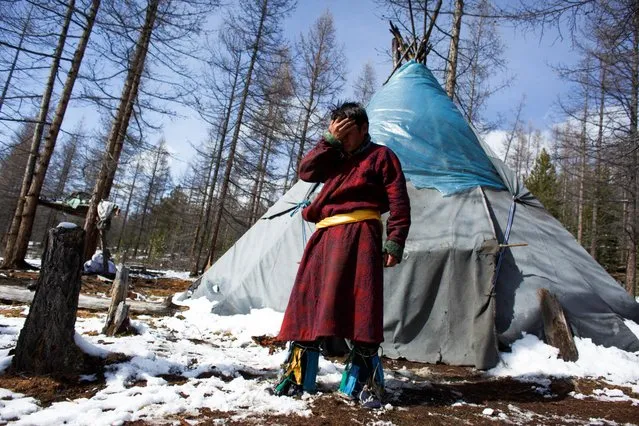
Shaman Kyzyl-ool reacts outside his tent after performing a ritual near the village of Tsagaannuur, Khovsgol aimag, Mongolia, April 19, 2018. “At the beginning I often thought, why me? I didn't like carrying these spirits, but I can't do anything about it, because I was chosen”, he said about becoming a Shaman. (Photo by Thomas Peter/Reuters)
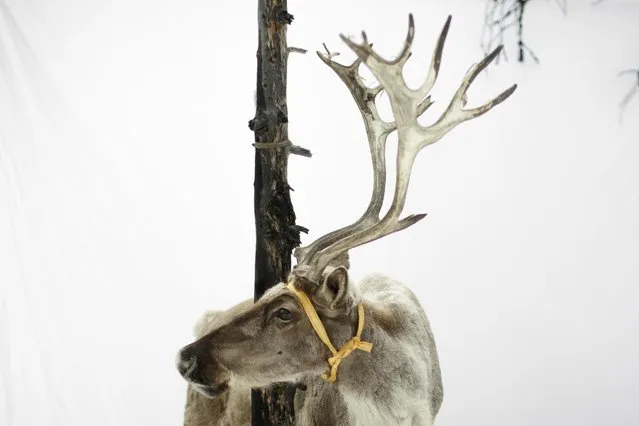
A reindeer of Dukha herder Erdenebat Chuluu stands in front of a white backdrop in a forest near the village of Tsagaannuur, Khovsgol aimag, Mongolia, April 21, 2018. Reindeer lose their antlers once a year and grow a new rack in late spring to early summer. Females, like this one, keep their antlers longer than males. (Photo by Thomas Peter/Reuters)
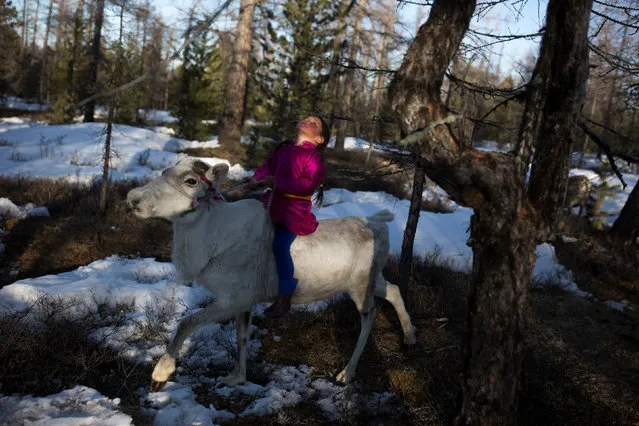
Tsetse, six-year-old daughter of Dukha herder Erdenebat Chuluu, rides a reindeer in a forest near the village of Tsagaannuur, Khovsgol aimag, Mongolia, April 21, 2018. Tsetse spends many hours every day darting through the forest on reindeer back. Because of their lighter bodyweight, children train young reindeer to get them used to carrying a rider and responding to a combination of vocal commands, prodding, heel-kicking and pulling the leash. (Photo by Thomas Peter/Reuters)
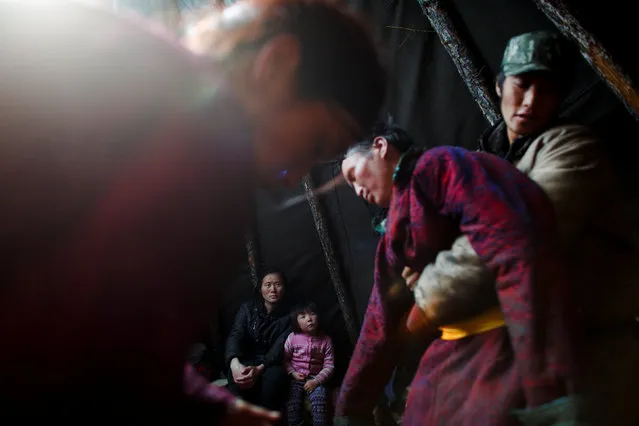
Shaman Kyzyl-ool collapses after performing a ritual in his tent near the village of Tsagaannuur, Khovsgol aimag, Mongolia, April 19, 2018. “When I begin the ritual I know what I'm doing, but when the spirit comes to me, I'm not in control anymore. When the spirit comes, I feel like I'm going into a dark hole”, he said after performing a ritual marking the first day of the lunar month in his tent. (Photo by Thomas Peter/Reuters)
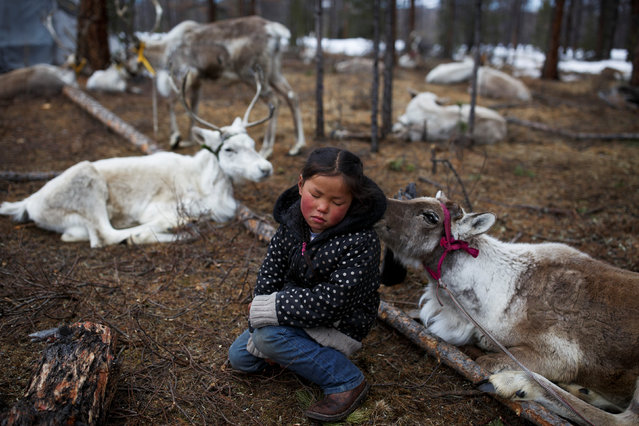
Tsetse, six-year-old daughter of Dukha herder Erdenebat Chuluu, sits among her family's reindeer in a forest near the village of Tsagaannuur, Khovsgol aimag, Mongolia, April 21, 2018. (Photo by Thomas Peter/Reuters)
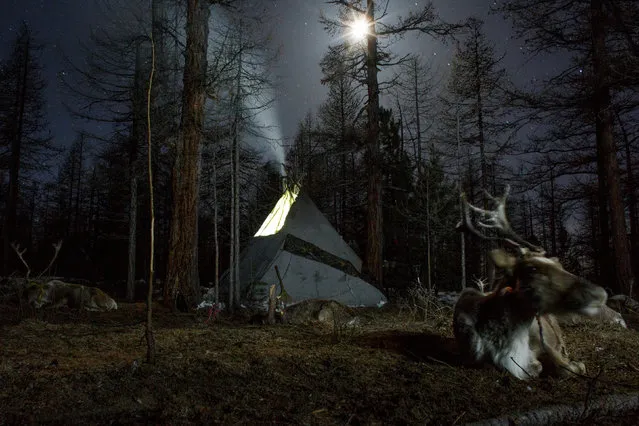
Smoke rises from the chimney of the family tent of Dukha herder Erdenebat Chuluu in a forest near the village of Tsagaannuur, Khovsgol aimag, Mongolia, April 21, 2018. “We wake up and have breakfast then release the reindeer. We herd them and at twelve o'clock we make them come back. Then while they are tied up, I chop some wood and do some other chores. I then relax for an hour or so. Later I release the reindeer again and around seven or eight o'clock I bring them back and tie them up again. By then, the woman of the family would have prepared some food, so this is how we spend our day”, Chuluu said. (Photo by Thomas Peter/Reuters)
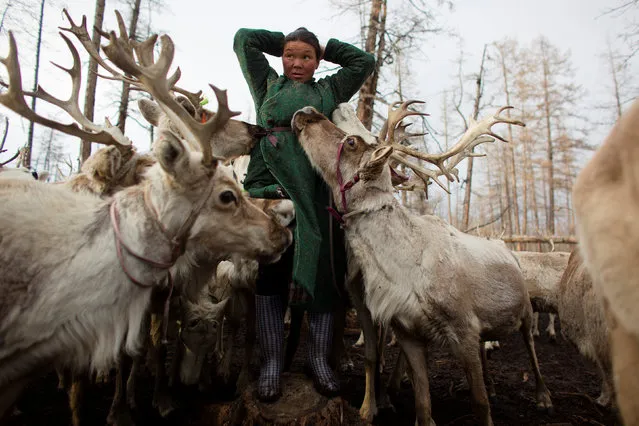
Reindeer lick the salt off the coat of a Dukha nomad in the camp of her family in a forest near the village of Tsagaannuur, Khovsgol aimag, Mongolia, April 20, 2018. (Photo by Thomas Peter/Reuters)
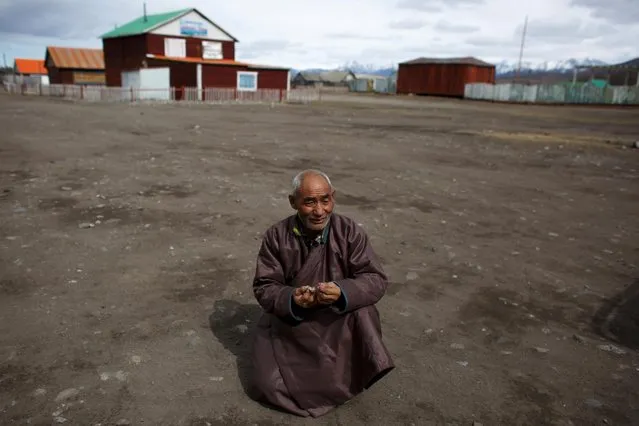
Ethnic Dukha Purevjav Roslov sells jewellery made from wolf ankles to tourists in the settlement of Ulaan-Uul, Khovsgol aimag, Mongolia, April 17, 2018. “We kill the wolves to protect the reindeer and to earn money from the tourists”, he said, adding that this was his main business, as it is more lucrative than herding reindeer. (Photo by Thomas Peter/Reuters)
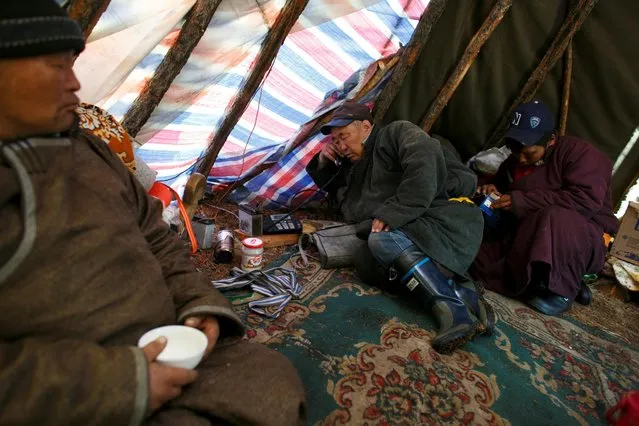
Local doctor Davaajav Nyamaa uses a telephone to call patients in a tent in the Taiga forest near the village of Tsagaannuur, Khovsgol aimag, Mongolia, April 20, 2018. The nomads use large antennas which they attach to the trees to connect to the 3G mobile network. (Photo by Thomas Peter/Reuters)
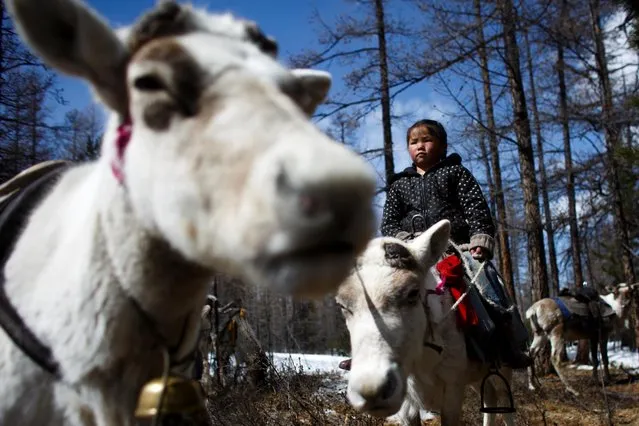
Tsetse, six-year-old daughter of Dukha herder Erdenebat, rides a reindeer in a forest near the village of Tsagaannuur, Khovsgol aimag, Mongolia, April 18, 2018. (Photo by Thomas Peter/Reuters)
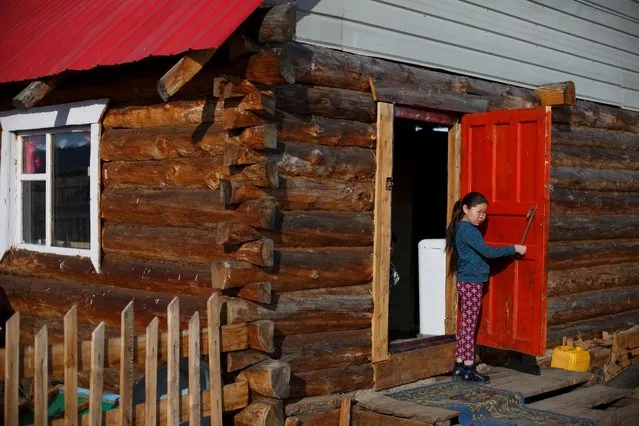
Ethnic Dukha pupil Davaajargal Taivan stands outside the rented house of her family in Tsagaannuur, Khovsgol aimag, Mongolia, April 23, 2018. Taivan's family decided to use government's monthly handout to rent a house in the village, so that her mother can be with her and her brother while they attend school. (Photo by Thomas Peter/Reuters)
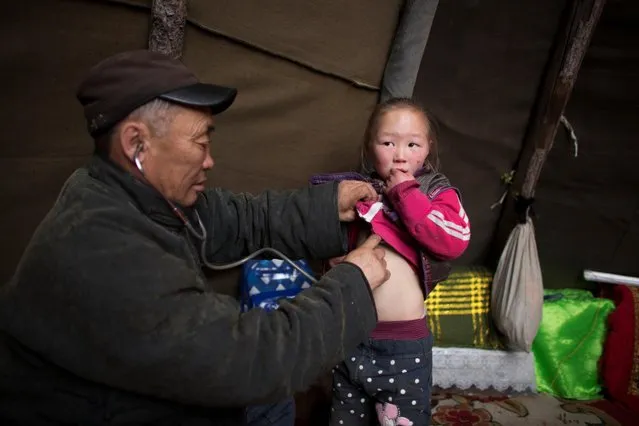
Local doctor Davaajav Nyamaa visits a patient in her family's tent in the Taiga forest near the village of Tsagaannuur, Khovsgol aimag, Mongolia, April 19, 2018. (Photo by Thomas Peter/Reuters)
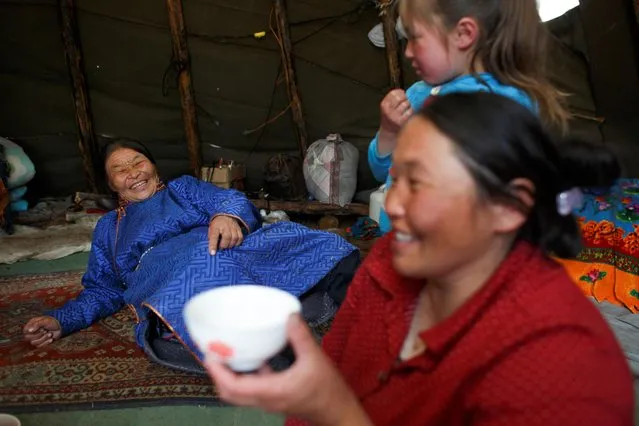
Ethnic Dukha Jargal Gombosed talks with her daughter and granddaughter in their tent in a forest near the village of Tsagaannuur, Khovsgol aimag, Mongolia, April 20, 2018. “In my day, everything, like rice and flour, were really rare. But now, as long as you have money, you can get anything, any clothes”, Gombosed said. “Things were different in the past”, she said. “When I was young we didn't have any such thing as a phone, so you would only hear news when you went down to the village centre. But now people have phones and also TVs”. (Photo by Thomas Peter/Reuters)
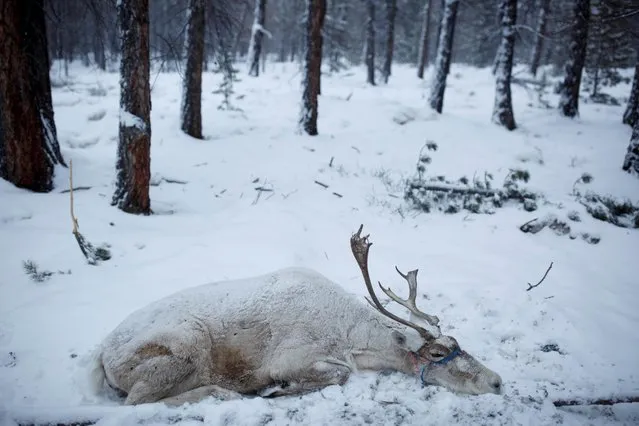
A reindeer lies in the snow in the camp of Dukha reindeer herder Erdenebat Chuluu at daybreak in the forest near the village of Tsagaannuur, Khovsgol aimag, Mongolia, April 19, 2018. Reindeer feel most comfortable in cold climate, which is why the Dukha move their camps higher up the mountains in summer. (Photo by Thomas Peter/Reuters)
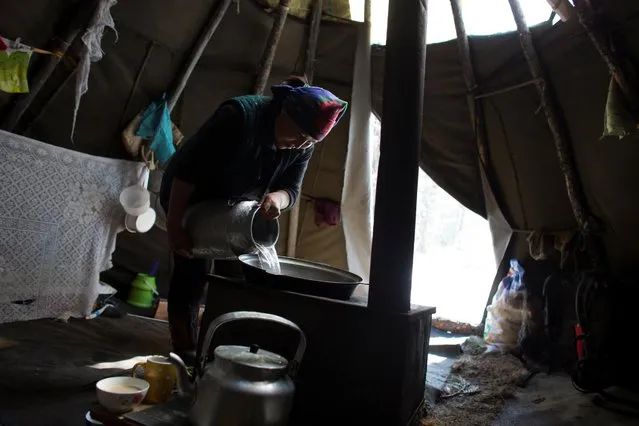
Baigalmaa Munkhbat prepares food for her nomad family in their tent near the village of Tsagaannuur, Khovsgol aimag, Mongolia, April 19, 2018. (Photo by Thomas Peter/Reuters)
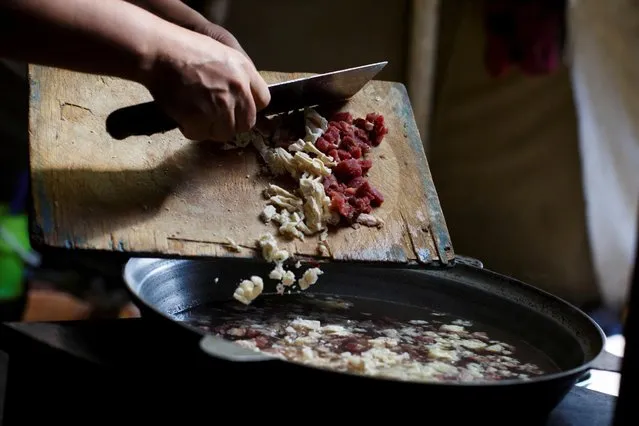
Baigalmaa Munkhbat prepares food for her family in their tent near the village of Tsagaannuur, Khovsgol aimag, Mongolia, April 19, 2018. The diet of the nomad consists mainly of meat and products made with flour, like dough to make dumplings and a local type of pasta. (Photo by Thomas Peter/Reuters)
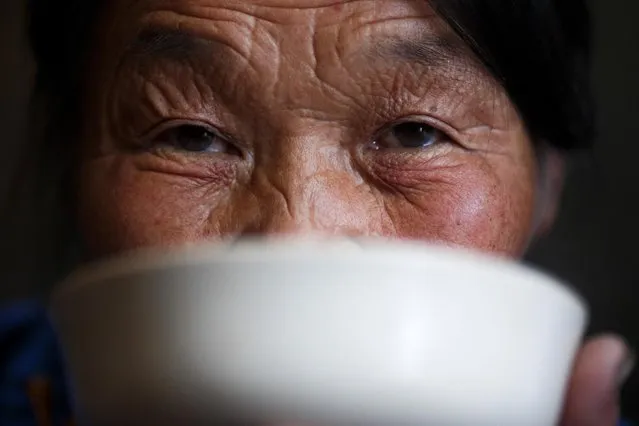
Ethnic Dukha nomad Jargal Gombosed drinks salty milk tea in her tent in the forest near the village of Tsagaannuur, Khovsgol aimag, Mongolia, April 20, 2018. (Photo by Thomas Peter/Reuters)
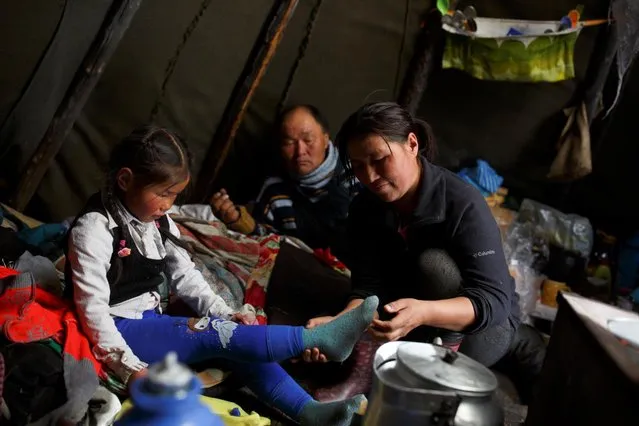
Baigalmaa Munkhbat dresses her six-year-old daughter Tsetse, as her husband Erdenebat Chuluu watches, in their tent near the village of Tsagaannuur, Khovsgol aimag, Mongolia, April 19, 2018. “My husband is a very good person, he provides for us in every way”, Munkhbat said. “My daughter is very smart for her age. I want to make sure my only daughter has all the skills she needs for life”, she said. (Photo by Thomas Peter/Reuters)
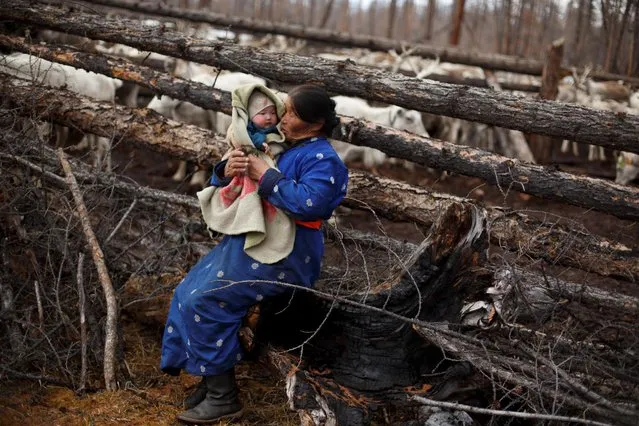
Ethnic Dukha nomad Jargal Gombosed holds her grandchild outside her family's reindeer pen in the forest near the village of Tsagaannuur, Khovsgol aimag, Mongolia, April 20, 2018. The pen holds the reindeer herd of the families of four of her children. (Photo by Thomas Peter/Reuters)
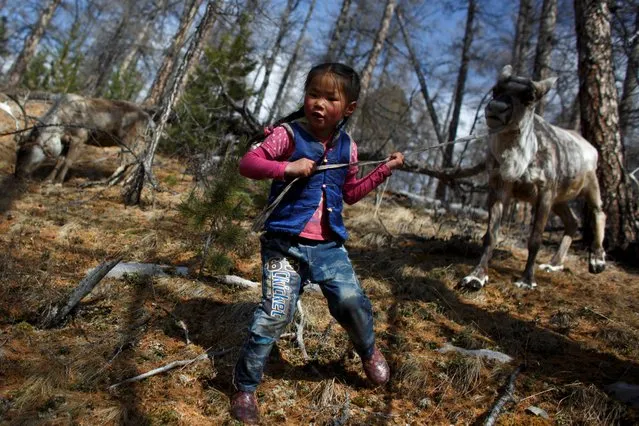
Tsetse, six-year-old daughter of Dukha herder Erdenebat Chuluu, leads a reindeer by the leash as she brings in the herd before nightfall in a forest near the village of Tsagaannuur, Khovsgol aimag, Mongolia, April 18, 2018. The herd is taken to nearby grazing spots twice a day. (Photo by Thomas Peter/Reuters)
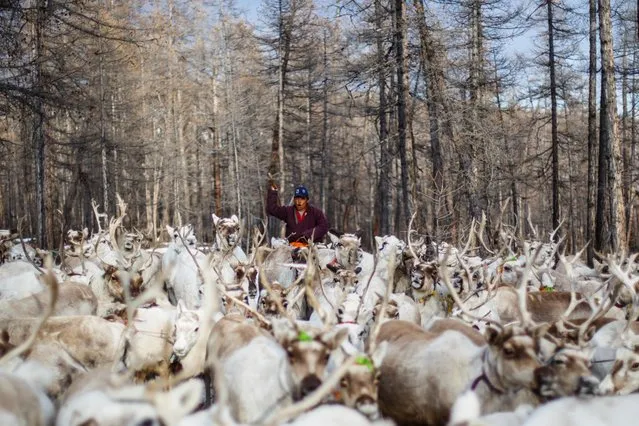
A Dukha nomad drives a herd of reindeer in a forest near the village of Tsagaannuur, Khovsgol aimag, Mongolia, April 20, 2018. This herd of some 300 heads is the combined property of four families. (Photo by Thomas Peter/Reuters)
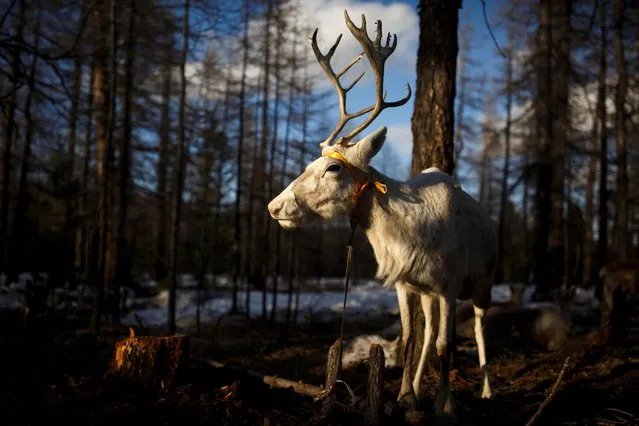
A reindeer stands in the evening sun after an afternoon of grazing in the camp of Dukha reindeer herder Erdenebat Chuluu in a forest near the village of Tsagaannuur, Khovsgol aimag, Mongolia, April 18, 2018. (Photo by Thomas Peter/Reuters)
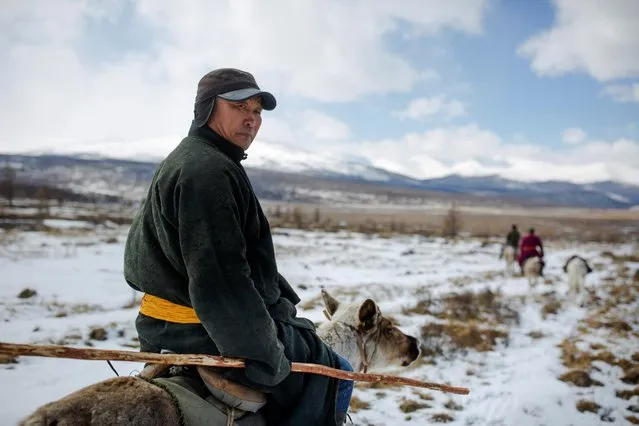
Local doctor Davaajav Nyamaa rides a reindeer to visit nomads in the forest near the village of Tsagaannuur, Khovsgol aimag, Mongolia, April 19, 2018. Nyamaa is an ethnic Darkhad, herders of northern Mongolia who have historically inhabited the steppe that borders the Taiga forests. He grew up around the Dukha, whom he visits as a doctor for checkups and treatments in their tents on a regular basis. (Photo by Thomas Peter/Reuters)
26 May 2018 00:03:00,
post received
0 comments
